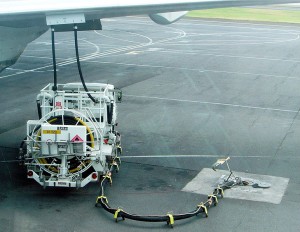Advertiser Disclosure: Eye of the Flyer, a division of Chatterbox Entertainment, Inc., is part of an affiliate sales network and and may earn compensation when a customer clicks on a link, when an application is approved, or when an account is opened. This relationship may impact how and where links appear on this site. This site does not include all financial companies or all available financial offers. Opinions, reviews, analyses & recommendations are the author’s alone, and have not been reviewed, endorsed, or approved by any of these entities. Some links on this page are affiliate or referral links. We may receive a commission or referral bonus for purchases or successful applications made during shopping sessions or signups initiated from clicking those links.
From all reports it looks like Delta will be in the oil refining business as soon as next week according to this CNBC report. I blogged about this in my weekly Delta news roundup last week. The refinery in question is located in Trainer Pennsylvania.
This is truly an interesting move by Delta. Airline “people” are not risk averse or they would not be in the airline business. We all know that one of the biggest costs to run an airline is jet fuel. Fuel requirements are more or less a known variable, and every cent up or down in price can make a HUGE impact on profitability for an airline.
So is this a good idea? Time will tell. Delta is right now making money with more earning reports out soon. It is hard to make money in this industry and the margins in the refining business are also very thin and one of the reasons the Trainer facility was shut down last fall but Delta does not need to make as much money on this as a stand alone business since all they want is cheaper Jet Fuel.
Delta expect to save money, as much as 10%, by buying wholesale Jet Fuel by both making it and, in effect, trading the rest of the output from production for more Jet Fuel. Long term Delta’s NYC expansion / domination strategy and now this facility nearby could be brilliant or another way for airlines to lose even more money. The price of crude oil now will impact Delta good or bad even more!
So what do you think. I have set up a poll on the top right of the blog and will have some fun topics now and then where you can weigh in and give your feedback. Do you think it is a good idea for Delta to get into the oil refining business? Yes / No / Don’t know? – René
▲Delta▲ SkyMiles® Credit Card
American Express – RESERVE/PLATINUM/GOLD
Click here for more information
Advertiser Disclosure: Eye of the Flyer, a division of Chatterbox Entertainment, Inc., is part of an affiliate sales network and and may earn compensation when a customer clicks on a link, when an application is approved, or when an account is opened. This relationship may impact how and where links appear on this site. This site does not include all financial companies or all available financial offers. Opinions, reviews, analyses & recommendations are the author’s alone, and have not been reviewed, endorsed, or approved by any of these entities. Some links on this page are affiliate or referral links. We may receive a commission or referral bonus for purchases or successful applications made during shopping sessions or signups initiated from clicking those links.










If Delta is interested in hedging its fuel costs, it would have been much better served by buying oil reserves and production rather than a refinery. If oil goes from $100/bbl. to $150/bbl. refining margins won’t change much but the price of criude will go up by 50% and the price of jet fuel would change pretty much in line with crude prices. Not really understanding the logic here.
@nickfromct, It makes sense in a different way from buying the raw input. Their goal is not to hedge against changes in fuel costs. Their goal is to save across the board on fuel costs. They can’t actually buy enough oil fields and/or production to adequately offset the risk involved with price fluctuations.
There are many, many examples of what happens when I business expands into an industry they know little about and have not been in before. They are almost universally bad. I think this will be viewed as one of Delta’s worst blunders in the long term, but I do like that they are “thinking outside the box.”
I think they need to stick to what they know — flying an airline. And even that they often don’t get right.
I see nothing wrong with vertical integration especially with an input that is such a high percentage of the cost of their product.
Fuel should be pass through cost to consumers, nothing more.
Hedging costs money, but less than deviating from core competency.
Vertical integration — how much benefit can they capture? Seems too capital intensive, and margins are already too thin — meaning little benefit could possibly accrue to DL in even best synergy case? Let big players focus on commodity production and processing. No ability to pass through costs to consumers if they screw this up.
If concern is Volatility — driving inability to pass through costs in short run (adjustments to ticket/freight prices), bear the transaction costs & associated risks and hedge. Minimal extra cost over competition.
Volatility, and/or fuel price increases, cannot be the main driver that is putting airlines out of business. Does impact financials in short run. But it seems to me that, instead, it brings to light/exacerbates CORE problems in the industry: poor business models, absurd regulation, misunderstood pricing, overcapacity, and poor demand forecasting.